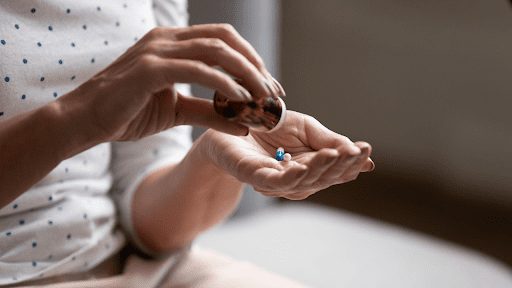Depression is among the most commonly diagnosed mental health disorders, with 18.5% of US adults having depression symptoms for at least two weeks in 2019. Of those, more than half (11.8%) experienced mild symptoms, while only 4.2% felt moderate symptoms.
Despite its prevalence, many do not start depression treatment after being diagnosed, and some with symptoms are not ever formally diagnosed. Treatment of this condition is critical, due to the potential for ongoing impairment and other negative impacts, even with mild depression symptoms.
Read on to learn the differences between mild and moderate depression. Then explore two common treatments and how they apply to mild-to-moderate depression disorders.

When comparing mild vs. moderate depression, the critical difference is the severity of symptoms. Severity is defined by the number of symptoms, how often they occur, and how detrimental they are to an individual’s well-being. Moderate depression may have many symptoms, the severity and distress may be more pronounced, or both. Any form of depression may become more severe if left untreated, and this would likely be more difficult to tolerate with moderate symptoms.
Mild depression may have the minimum number of symptoms and enough impairment to be distressing but not unmanageable. It may be difficult to diagnose because the symptoms may be easy to dismiss or not see as a cohesive problem.
Cognitive behavioral therapy (CBT) for mild to moderate depression and anxiety helps individuals cope with their symptoms. CBT sessions address how thoughts, emotions, and behaviors work together to influence well-being. Treatment sessions are usually held once a week and can continue from a few weeks to several months. Individuals can see symptom improvement in a short time and is considered a brief therapy. Once symptoms improve, the time between sessions can be extended or therapy can end completely.
There are many benefits to targeted cognitive therapy, addressing unhelpful thoughts, learning to reduce emotional distress, and using coping skills. While therapy can be effective for many people, emotional discomfort may arise. Confronting painful thoughts and emotions is often necessary for making beneficial life changes and can be distressing at times. With guidance and support from a skilled therapist, discomfort can be minimized or managed.
Antidepressants for mild to moderate depression work by impacting neurotransmitters, brain chemicals related to moods and emotion. These medications affect the way neurotransmitters interact with nerve cells, resulting in a less negative mood, better sleep, and improved cognition.
An individual can see improvement within four to six weeks in many cases. Dosage may depend on the specific symptoms, their severity, and the medication’s potential side effects. If an individual does not get at least partial relief, another antidepressant may need to be considered.
Older tricyclic antidepressants were among the first medications developed for depression and are still used, but they have more adverse effects. More recently developed antidepressants have few discomforts or safety concerns, and they are helpful for most people who try them.
Treatment approaches for mild and moderate depression have similar elements and are based on the negative impact symptoms have on an individual’s life.
Psychotherapy is a primary treatment for mild depressive symptoms, with cognitive therapy being a highly effective option. Symptom monitoring is also part of the protocol. Antidepressants may be helpful but may only be needed if an individual’s symptoms do not improve enough with therapy alone.
Both cognitive therapy and antidepressants are first-line treatments for moderate depression. Either one may be used alone, or both may be used together for the greatest efficacy. As with mild depression, the use of both treatments may be reserved for individuals who do not get enough symptom relief with only one treatment.

Mild-to-moderate depression is a prevalent and highly treatable condition. Milder symptoms may seem manageable for some, and many individuals do not seek treatment. But to avoid functional decline and negative consequences, treatment is often necessary. Observe your symptoms, consider your treatment choices, and take the first step toward better depression symptom relief.